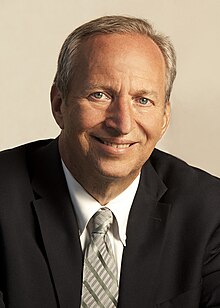Lawrence Summers
| Lawrence Summers | |
|---|---|
 |
|
| 8th Director of the National Economic Council | |
|
In office January 20, 2009 – December 31, 2010 |
|
| Deputy |
Diana Farrell Jason Furman |
| Preceded by | Keith Hennessey |
| Succeeded by | Gene Sperling |
| 27th President of Harvard University | |
|
In office July 1, 2001 – June 20, 2006 |
|
| Preceded by | Neil Rudenstine |
| Succeeded by | Derek Bok (Acting) |
| 71st United States Secretary of the Treasury | |
|
In office July 2, 1999 – January 20, 2001 |
|
| President | Bill Clinton |
| Preceded by | Bob Rubin |
| Succeeded by | Paul O'Neill |
| United States Deputy Secretary of the Treasury | |
|
In office August 11, 1995 – July 2, 1999 |
|
| President | Bill Clinton |
| Preceded by | Frank Newman |
| Succeeded by | Stu Eizenstat |
| Undersecretary of the Treasury for International Affairs | |
|
In office April 5, 1993 – August 11, 1995 |
|
| President | Bill Clinton |
| Preceded by | David Mulford |
| Succeeded by | Michael Bruno |
| Chief Economist of the World Bank | |
|
In office January 14, 1991 – January 1993 |
|
| Preceded by | Stanley Fischer |
| Succeeded by | Michael Bruno |
| Personal details | |
| Born |
Lawrence Henry Summers November 30, 1954 New Haven, Connecticut, U.S. |
| Political party | Democratic |
| Spouse(s) | Victoria Perry (1984–2003) Elisa New (2005–present) |
| Education |
Massachusetts Institute of Technology (BS) Harvard University (MA, PhD) |
| Signature | |
| Academic career | |
| Field | Macroeconomics |
| School or tradition |
New Keynesian economics |
| Doctoral students |
Alan Krueger |
| Information at IDEAS / RePEc | |
Lawrence Henry "Larry" Summers (born November 30, 1954) is an American economist who is President Emeritus and Charles W. Eliot University Professor of Harvard University.
Born in New Haven, Connecticut, Summers became a professor of economics at Harvard University in 1983. He left Harvard in 1991, working as the Chief Economist at the World Bank from 1991 to 1993. In 1993, Summers was appointed Undersecretary for International Affairs of the United States Department of the Treasury under the Clinton Administration. In 1995, he was promoted to Deputy Secretary of the Treasury under his long-time political mentor Robert Rubin. In 1999, he succeeded Rubin as Secretary of the Treasury. While working for the Clinton administration Summers played a leading role in the American response to the 1994 economic crisis in Mexico, the 1997 Asian financial crisis, and the Russian financial crisis. He was also influential in the American advised privatization of the economies of the post-Soviet states, and in the deregulation of the U.S financial system, including the repeal of the Glass-Steagall Act.
Following the end of Clinton's term, Summers served as the 27th President of Harvard University from 2001 to 2006. Summers resigned as Harvard's president in the wake of a no-confidence vote by Harvard faculty, which resulted in large part from Summers's conflict with Cornel West, financial conflict of interest questions regarding his relationship with Andrei Shleifer, and a 2005 speech in which he suggested that the under-representation of women in science and engineering could be due to a "different availability of aptitude at the high end," and less to patterns of discrimination and socialization. Remarking upon political correctness in institutions of higher education, Summers said in 2016, "There is a great deal of absurd political correctness. Now, I’m somebody who believes very strongly in diversity, who resists racism in all of its many incarnations, who thinks that there is a great deal that’s unjust in American society that needs to be combated, but it seems to be that there is a kind of creeping totalitarianism in terms of what kind of ideas are acceptable and are debatable on college campuses."
...
Wikipedia
